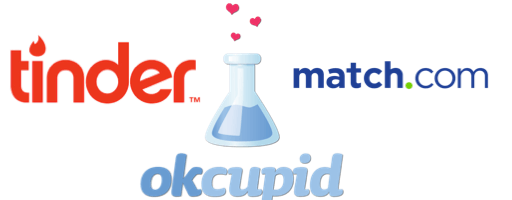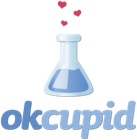Digital Matchmakers Win!

Tinder, OKCupid, and Match.com create aggregate value for their owner, IAC Holdings.
The Internet has revolutionized the dating scene in the past 15 years. We have all heard of Tinder, OkCupid, and Match.com. Well, all these companies are digital innovators in their own right, but they are also part of The Match Group, a business segment of IAC Holdings. IAC Holdings has found a way to create value at every stage of our dating life, but doing so allows them to capture even greater value for themselves.
Swipe Right for Mr./Ms. Right Now

For casual daters, Tinder allows people to judge dateability based almost exclusively on appearance. We know to “swipe right” if you like, “swipe left” if you don’t. The app has functionality to filter contenders based on how far they are from your location. Bored on a Saturday night and would like to meet someone new with the least amount of work? Worry not! Tinder is there creating value for you! The app has made some money for its parent company through Tinder Plus (offering additional features such as finding matches in other cities) and, more recently, advertisement. However, the value capture point is in that Tinder serves as a gateway drug for serial daters.
Time To Date Someone Right

OkCupid, also part of The Match Group, is a free dating app that allows for a more detailed user profile and asks questions to give you matches based on your interests. So you have met a few creeps on Tinder, you want to get more serious about dating, but you are not yet ready to pay for it… OkCupid creates the value that you need! You will meet people who, like you, wanna go on a real date with someone they could actually date a few more times. Maybe you both like fly-fishing, sounds like a match made in free heaven. Wait, but how does OkCupid capture value? The site’s revenues come from advertisers and from users tricked into paying $4.95 a month to join the ‘A List’ and see their secret matches revealed.
Ready for Mr./Mrs. Right
![]()
Match.com, considered the largest and most popular dating site on the planet (75M users!), is also part of The Match Group. Match takes online dating to the next level by using machine learning to algorithmically learn your preferences and produce higher quality matches. So your 3rd 1.5 month relationship from OkCupid has ended and you are tired of being asked to be to be “the lover of an older man” or “the third to a married couple.” What now? Meet Match.com and its millions of paying potential matches. The Match.com fee filters out creeps and players. You know you are serious about dating when you are shelling $20-$40 per month to find that special one. In the end the site creates value for the customers (read their success stories here) while capturing the variable fee. This is hopefully the final destination for serial daters, unless of course…
The Value is Real
Gone are the days when people took the chance of meeting someone at a bar or at a friend’s party. Online dating reduces the time it takes to find a special someone, and increases the diversity of options. We have placed enough trust on online communities that we feel safe meeting strangers after a few digital conversations. Additionally, questionnaires and machine learning algorithms keep improving to find us increasingly better matches. The opportunities are vast for serial daters, but the value captured by IAC is real too. Tinder may not make big dollars for IAC Holdings at the moment, but by disguising itself as a “game that you would want to play even if you weren’t looking for a date”, Tinder serves as gateway for online dating. Tinder users are more likely to transition to a traditional dating site such as OkCupid or Match.com, sites that actually generate revenue dollars for IAC Holdings. Additionally, Match.com and OkCupid are dating-knowledge (data) repertoires that release somewhat anthropological studies about the dating scene in hopes lure potential users (and help current ones). This data it is shared (for a fee?) with advertisers/partners and (for free?) with other IAC companies, such as Plenty of Fish and SpeedDate.com. This incestuous data-sharing environment enables IAC Holdings to continuously improve its service offering.
Match.com was created in 1993. Its longevity, along with the $2B tag on the online dating industry, comes to prove that the value is real for serial daters as well as for digital matchmakers.
Sources:
- http://www.theroot.com/articles/culture/2015/09/should_you_swipe_right_on_these_dating_apps.html
- http://motherboard.vice.com/blog/in-defense-of-okcupids-a-list
- http://www.lauraruderman.org/how-much-does-match-com-cost/
- http://dontmindthemess.com/2014/03/online-dating-throwdown-match-okcupid/
- http://blog.match.com/category/success-stories/
- http://www.ft.com/cms/s/2/f31cae04-b8ca-11e0-8206-00144feabdc0.html
- http://www.computerworlduk.com/security/what-will-matchcom-do-with-okcupid-data-3260887/
- http://time.com/4837/tinder-meet-the-guys-who-turned-dating-into-an-addiction/
- https://www.abine.com/blog/2012/privacy-on-okcupid/
- https://en.wikipedia.org/wiki/Match.com
- https://en.wikipedia.org/wiki/IAC_(company)



Great post — It’s interesting to think about Tinder, OK Cupid, and Match as a play to win the dater at every stage of their life, allowing IAC Holdings to get us used to the concept of online dating as young adults on Tinder, more serious with dating through OK Cupid, and eventually bought into Match.com when we’re more mature. Smart segmentation of the market, without us even realizing it as a consumer.
Great post! What I find most intriguing is the statement that “we have placed enough trust on online communities that we feel safe meeting strangers after a few digital conversations.” Absolutely true and a little bit scary, given that Tinder is barely a step up from meeting weirdos / serial killers who post on Craigslist’s personal ads. I think that a big part of The Match Group’s digital win is convincing people that signing up via a Facebook profile provides sufficient verification of a person’s identity, relative to say Craigslist. Smart way to get over a hurdle to getting into the dating app funnel.
Great post & I wholeheartedly agree that Tinder serves as a “gateway drug”, but with competitors like Hinge, Bumble, Coffee Meets Bagel, and The League curating your matches while retaining swipeability, I wonder if Tinder will instead funnel users to the competition.
Great article. I agree with the comment above. There is a trade off between leveraging network effect and getting more people on the platform to improve choices for each user, and curating potential matches to reduce irrelevant matches. That said, I think there is value in providing some sense of control to the user, like tinder aims to do as opposed to some platforms that say show only a single match on a given day. But with
Great article. I agree with the comment above. There is a trade off between leveraging network effect and getting more people on the platform to improve choices for each user, and curating potential matches to reduce irrelevant matches. That said, I think there is value in providing some sense of control to the user, like tinder aims to do as opposed to some platforms that say show only a single match on a given day. But reducing the signal to noise ratio will be the biggest concern for tinder
I agree that the Match Group has won in the online dating space through the addition of Tinder as a “gate-way drug” mentioned in the post. To add to that, I think the Match Group has also made a strategic move to going mobile as they launched Tinder as an mobile based service. Match.com and OKcupid were traditionally visited through PC web and they were lacking a mobile presence, so the Tinder app was key to making the group relevant again.
That being said, it seems that online dating has become somewhat commoditized as there are a slew of competitors entering the mobile space in this industry. Many people use 2-3 different dating apps at once and I can’t help but think that the monetization in this mobile market will be a difficult one.
Interesting post! I didn’t know that all three dating apps are owned by the same parent company. Dating apps are really changing how people meet and date these days as they provide a much larger pool of potential matches than traditional matchmaking. However, I always wonder if dating app businesses have conflicting interests as they want to monetize by keeping users in the app longer while at the same time delighting users with matches that will eventually make them churn. It’s a fine balance for most profitable dating apps.
Great post.
I found impressive how the way we interact with technology has changed so much the way we interact with people. I agree with you comment on how dating apps simplify the process of finding someone. I wonder what is the level of satisfaction of these products and which of them are here to stay vs which are just in fashion for a few months, and if so, what is the strategy that match.com needs to follow to remain active in the industry with so many recent disruptions.
Great post!
I wonder, as this landscape continues to develop, how will those in power stay ahead. It seems to me that they are all trying to differentiate themselves, but the differentiation is becoming less about the digital functionality, and more about the PR buzz, or social network effect. For a dating app, the app is only as good as the people using it and their shared experiences. Word of mouth is vital in this industry. The swipe right functionality is innovative and a brand distinction, but if there is no one on tinder because it has fallen out of fashion, the left swipe will be getting all the action.